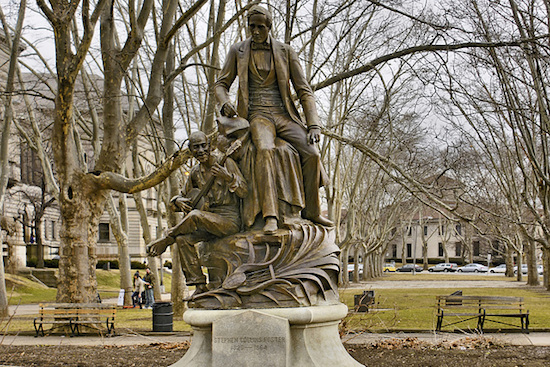The Latest Battle In the Statue Wars: Stephen Foster
A famous statue of Stephen Foster, often referred to as the father of American music, has stood in Pittsburgh for more than 100 years. (Foster was a native of Pennsylvania.) It was sculpted by Italian emigre Giuseppe Moretti:
Today Moretti’s statue of Foster was carted away by Pittsburgh authorities:
A 118-year-old statue of the “Oh! Susanna” songwriter was removed from a Pittsburgh park Thursday after criticism that the work is demeaning because it includes a slave sitting at his feet, plucking a banjo.
In October, the Pittsburgh Art Commission voted to take the Stephen Foster sculpture out of Schenley Plaza and find it a new home. For now, it will remain in a storage lot, out of the public view.
On Thursday, workers used straps and construction equipment to lift the 10-foot-bronze statue off its base. It was strapped to a flatbed truck and taken away.
This statue controversy is different from the ones surrounding Robert E. Lee, Stonewall Jackson and (weirdly) William McKinley. I take it there is no objection to Foster. Rather:
The shoeless banjo player is based on “Uncle Ned,” a fictional slave and subject of a song by the same name. Critics have long decried the statue as racist.
“It’s the single most offensive display of public art in Pittsburgh, hands down,” Paradise Gray, a hip-hop activist, musician and writer, told the Post-Gazette in August. “It permanently depicts the black man at the white man’s feet.”
It is true that the fictional Uncle Ned occupies a subordinate position in the statue. This seems natural, since the statue is a tribute to Stephen Foster, while Uncle Ned didn’t exist. But to me, it seems blindingly obvious that the statue portrays a kinship between Foster and the blacks who helped to inspire, and who performed, his music. Now, the fictional slave will be erased from public view altogether. Is that an improvement?
Perhaps some would prefer not to be reminded that slavery once existed. I believe Thomas Sowell noted years ago that slavery existed from time immemorial on every continent except Antarctica. The extraordinary historical fact is not the existence of slavery, but rather its abolition. But that is a larger subject for another day.
The Associated Press says that “[a] statue honoring an African-American woman will be put up in its place. Residents can submit nominations.” In today’s environment any African-American woman will do, apparently. Not a man like the fictitious Ned.
Stephen Foster was undoubtedly one of America’s greatest composers of popular music. It is remarkable that a number of his songs are still widely known, and sung, today. And yet he died at 37, young and broke. His career parallels that of Edgar Allen Poe, who was a near-contemporary. Poe also died young and broke, despite having invented both the horror story and the detective story, genres that have conferred great riches on countless lesser artists. The same is true of Foster.
Wikipedia says that Foster was the first songwriter to refer to an African-American woman as a lady, in “Nelly Was a Lady.” It occurs to me that contemporary songwriters–rappers like Paradise Gray–typically don’t refer to African-American women as ladies.
I think they took down the wrong statue.
